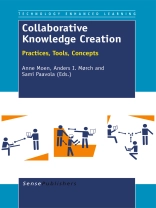This book presents perspectives on the knowledge creation metaphor of learning, and elaborates the trialogical approach to learning. The knowledge creation metaphor differs from both the acquisition and the participation metaphors. In a nutshell trialogical approaches seek to engage learners in joint work with shared objects and artefacts mediated by collaboration technology. The theoretical underpinnings stem from different origins, including Bereiter and Scardamalia’s theory on knowledge building and Engeström’s activity theory. The authors in this collection introduce key concepts and techniques, explain tools designed and developed to support knowledge creation, and report results from case studies in specific contexts. The book chapters integrate theoretical, methodological, empirical and technological research, to elaborate the empirical findings and to explain the design of the knowledge creation tools. The target audiences for this book are researchers, teachers and Human Resource developers interested in new perspectives on collaborative learning, technology-mediated knowledge creation, and applications of this in their own settings, for higher education, teacher training and workplace learning. The book is the result of joint efforts from many contributors who took part in the Knowledge-practices Laboratory (KP-Lab) project (2006-2011) supported by EU FP6.
Tabela de Conteúdo
Preface; Collaborative Knowledge Creation: Introduction; The Trialogical Approach as a new Form of Mediation; Tacit Knowledge and Trialogical Learning: Towards a Conceptual Framework for Designing Innovative Tools; Reference Ontology for Knowledge Creation Processes; KPE (Knowledge Practices Environment) Supporting Knowledge Creation Practices in Education; A Pragmatic Approach to Collaborative Semantic Modelling: The Visual Modelling (Language) Editor; Analysing Expansive Learning in a Multi-Layered Design Project; Mirroring Tools for Collaborative Analysis and Reflection; Using Trialogical Design Principles to Assess Pedagogical Practices in two Higher Education Courses; Trialogical Design Principles as Inspiration for Designing Knowledge Practices for Medical Simulation Training; A Product Development Course as a Pedagogical Setting for Multidisciplinary Professional Learning; Shared Epistemic Agency for Knowledge Creation: An Explorative case Study; Developing Epistemic Agencies of Teacher Trainees – Using the Mentored Innovation Model; Working Within Knowledge Communities as a Context for Developing Knowledge Practices; Consolidating work Descriptions: Creating Shared Knowledge Objects; About the Authors; Subject Index.












